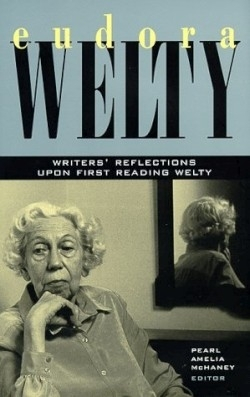Eudora Welty
Writer's Reflections upon First Reading Welty
On the occasion of the great Southern author Eudora Welty’s ninetieth birthday, this collection of essays, letters and poems is a testament to the written word. Contributors include more than twenty renowned authors, editors and close friends of Welty. The collection reminds one that which is the most powerful enters our lives in humble packages; each contributor alludes to the quiet and unexpected way Welty influenced them. Boasting no extraordinary power, her work has turned these lives, among thousands of others, upside down or, rather, right side up. Each contributor brings her own style of charm and wit, recounting humorous tales and offering sincere praise regarding the author’s first encounter with Welty. Author Lee Smith remarks after seeing Welty for the first time, “I was deeply disappointed. Why, she certainly didn’t look like a writer! She didn’t have a cape, or boot’s, or anything.”
In addition, to simply praising Welty’s work this collection brings together a diverse grouping of authors, several of whom address the questions: Can a white person write about the black experience? Can a woman write a story through the eyes of a man? Can one write about the lives of those different from ourselves without insulting, trivializing or generalizing the “other’s” experience? These questions venture into dangerous and ill-charted territory, but French author Daniele Pitavy-Souques responds, “What marks Eudora Welty as a dominant figure in twentieth-century American literature, is the way she has pursued her examination of illusions and delusions, prejudice and violence.”
Perhaps one of the most beautiful entries is the poem, “The Listener,” by long-time friend William Jay Smith: “Now on your birthday we ask you to come down the stairs,/ trailing that train of stories,/ that long lustrous ribbon of fiction to tie up a present for the/ world from its privileged observer/…and we will listen as you have taught us to listen—in debt to you/ till the end of time.” Or maybe it is the entry by Bill Maxell whose letter to Welty recounts the subtleties of life ninety years ago, reminding the reader of the long temporal passage Welty and her work have traversed. Or maybe Alice Munroe’s observation is the most touching: “Gratitude seems paltry and amazement is somehow beside the point. You must just say yes, that’s it, that’s what’s been here, all the time.”
In short, the greatness of Welty’s life and work has inspired a plethora of beautiful, sharp and cunning writings; a small portion of which has been captured in this collection. Though the book contains a diverse representation of writing styles, the language is lucid and engaging for all persons interested in literature and the power of the written word. Recommended for writers, students and teachers.
Reviewed by
Jennifer Sperry
Disclosure: This article is not an endorsement, but a review. The publisher of this book provided free copies of the book to have their book reviewed by a professional reviewer. No fee was paid by the publisher for this review. Foreword Reviews only recommends books that we love. Foreword Magazine, Inc. is disclosing this in accordance with the Federal Trade Commission’s 16 CFR, Part 255.

